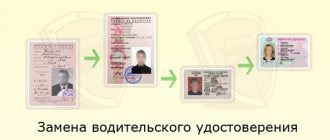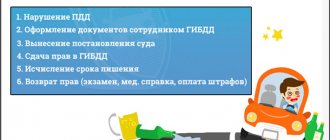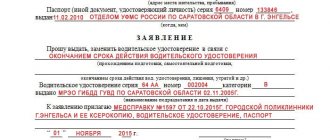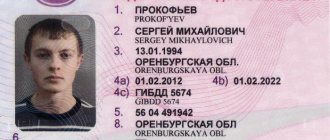Decisions on violation of traffic rules on the roads are among the most common in judicial practice. The consequences for car offenders are different. The main legislative provisions regarding such violations are summarized and discussed below.
In case of significant violations by the car owner of the Road Traffic Rules (TRAD), in accordance with the norms of the laws of the Russian Federation, an administrative measure is applied - deprivation of driving rights (DPR). Only a court can decide to temporarily suspend a driver from driving. In this case, the car owner has the right to send an application to a higher authority to appeal such a decision. The statute of limitations for deprivation of rights is ten days. Countdown - from the moment of receipt of the decision to suspend the right or its copy.
Procedure for deprivation of rights for drunkenness
Driving a vehicle while intoxicated is unacceptable. Due to the negligence of one person, other people may suffer. You will also be subject to the deprivation of your driver's license for alcohol and the imposition of fines. If the driver has not previously noticed such inappropriate behavior, he can be fined thirty thousand rubles and deprived of his license for a couple of years - it all depends on the specific circumstances.
In case of repeated violation, the terms of deprivation of a driver's license in court may increase. And the fine can rise to fifty thousand. Criminal penalties for drunk driving are now becoming common. If it involves causing serious physical harm to other citizens, the perpetrator may be given a prison term of two to nine years.
Why can your driver's license be revoked?
The reason for such punishment is serious offenses, which include:
- driving an unregistered car,
- driving without license plates,
- installation of state signs in the wrong place,
- the use of means that make it difficult to identify a car license plate,
- modification of license plates,
- driving with false documents,
- the use of lighting devices that do not comply with established legal standards,
- the use or installation of devices that provide light/sound signals,
- for alcohol intoxication detected in the driver,
- regular violation of the speed limit,
- crossing a railway track in the wrong place,
- driving into the oncoming lane,
- failure to comply with the rules for transporting dangerous goods,
- for leaving the scene of an accident before the arrival of law enforcement agencies,
- refusal of medical examination,
- causing harm to the victim in an accident,
- violation of the rules for transporting children at night,
- refusal to give way to cars with special sound/light identification and some other provisions.
Is it possible to win a court case against deprivation of rights for drunkenness?
This is a common question that our administrative law attorneys must answer:
- If procedural violations were committed during registration, the driver can count on the return of the right to drive freely. But proving the innocence of a particular citizen is not very easy without the help of an experienced specialist. Reliable and effective assistance from a driver's license lawyer is relevant if they are trying to take away your license for residual ethanol found in the blood, when consuming alcoholic beverages the day before the accident, and other conditions. A competent lawyer will find a lot of mitigating circumstances and help you preserve your rights or return them through a complaint against the decision of a judge in an administrative case in court.
- To challenge the legality of the actions of the traffic police and the police, you should go to court with the necessary package of documents or use the services of our experienced legal specialist.
What to say in court when you are deprived of your license for alcohol?
It all depends on the actual circumstances. The court will ask the traffic police inspector to attend the trial. You have the opportunity to ask him questions. For example, traffic police inspectors rarely bother to familiarize you with your rights. Ask him a question: did he familiarize you with your rights? And with which ones exactly? In addition, ask the same from witnesses. It is also necessary to ask questions about how exactly your vehicle was stopped by the traffic police inspector, who exactly did it, the vehicle is not always stopped by an authorized person.
In general, the more questions you ask, the more likely you are to confuse the inspector. Inconsistencies in the testimony of the traffic police inspector, witnesses, and witnesses can work to your advantage.
If all the evidence points to your guilt, it is better to confess; such a confession can at least reduce the term of your administrative punishment.
Disqualification period for driving while intoxicated
For drunk driving, a person can be fined 30,000 rubles and deprived of the right to drive vehicles for a period of eighteen to twenty-four months . At the same time, the specified period is influenced by many factors, such as:
- Difficult personal experiences, incl. problems of a family, household, work nature
- Good reference from neighbors, employer, teacher (teacher)
- Voluntary recognition of a committed unlawful act
- Other circumstances, the list of mitigating circumstances is not exhaustive
However, the presence of the above circumstances means nothing if you presented them to the court incorrectly. References to such circumstances before the court must be submitted in the correct order, well reasoned, and proven.
Where will the case be heard?
Only a court can deprive a driver of the right to drive a car. In this case, the consideration can be carried out in a district or magistrate court. District courts hear cases of higher complexity. To make a decision, it is necessary to provide the results of expert opinions, interviews with witnesses and many other arguments that will prove the undeniable guilt of the offender. Lighter cases are handled by the magistrate, but both courts can order disqualification.
Punishment for repeated deprivation of license for drunkenness
What is needed, in the opinion of the legislator, in order to bring some sense to a person who has once been brought to administrative responsibility for driving while intoxicated? We think you already understand - criminal liability, probably prison.
What is needed, in your opinion, to avoid this? We think that, like last time, you have already guessed - to defend yourself fiercely, with sweat and blood.
Thus, criminal liability for this criminal act provides for:
- imprisonment for 2 years;
- or forced labor for a period of up to four hundred eighty hours;
- or compulsory labor for up to two years (correctional colony);
- or a fine from 200,000 to 400,000 rubles.
In addition to having a criminal record, probable imprisonment or restriction of freedom, as well as a possible fine, you will have to deal with incredibly “nice” people, in the person of law enforcement and penitentiary systems employees.
Therefore, taking into account the above, we strongly advise you to go into battle not alone, but together with our professional lawyers who will seek the least punishment or acquittal, see more details VIDEO on defense:
Statute of limitations for deprivation of rights for drunkenness
In order for you to be held administratively liable for driving a vehicle while intoxicated, no more than three months must pass from the moment of commission of the act to the entry into force of the decision in the administrative offense case. If you miss the specified period, you cannot be brought to administrative responsibility for driving a vehicle while intoxicated.
Just imagine, first the employee needs to draw up a report on an administrative offense, a medical examination report, a report on suspension from driving a vehicle. Then all this needs to be agreed upon with the head of the traffic police department. Then send all these documents to the court, although this often happens by mail. After which the court needs to accept these documents for administrative proceedings.
Then the court needs to notify the offender about the upcoming court hearing, which also needs to be held. These procedural actions take approximately one and a half to two months from the moment of the violation itself. So, you, like the court, have about a month. Well, you can suddenly catch a cold, thereby losing the opportunity to participate in the trial.
In general, there are a great many reasons to delay the court’s decision on our case; it all depends on the imagination and procedural maneuvering skills of your Defender.
Does it work?
Often, many drivers try to be cunning and simply do not hand over their driver’s license to the traffic police. This is motivated by the fact that after the statute of limitations expires, the suspension from driving will not be carried out.
This point is covered in detail in the corresponding section of the Code of Administrative Offenses - Art. No. 31.9. This section determines that the statute of limitations for this type of administrative penalty is exactly 2 years.
Accordingly, the question arises: does this apply to passing a driver’s license?
IT IS IMPORTANT TO NOTE THAT THIS PROCESS HAS CERTAIN SUBTLETS AND NUANCES. FIRST OF ALL, IT WILL BE NECESSARY TO NOTE THAT MANY CITIZENS BELIEVE THAT IF THEY ARE SIMPLY NOT PASSED IN WITH THE DRIVING LICENSE, THEN THEY CAN SIMPLY WAIT TWO YEARS AND AVOID SUCH PUNISHMENT.
In fact, this question is reflected directly in Part 1 of Art. No. 32.7 Code of Administrative Offenses of the Russian Federation.
According to this legislative document, a decision to revoke a driver’s license comes into force only after it is submitted to the court.
Accordingly, even if the rights are not surrendered within 2 years, the statute of limitations simply does not begin to count.
This point will need to be worked out in different ways. Accordingly, there are many different quite specific points.
How to get your license back after being revoked for drunkenness?
You can return your driver's license the next day after the expiration of the administrative penalty. However, before going to the traffic police department, you must go through the following procedures:
- Pay all traffic fines, i.e. not only a fine imposed by the court, but also fines, say, for exceeding the speed limit;
- Pass the test on knowledge of traffic rules
- Pass a medical examination
We also draw your attention to the fact that you can return your rights, subject to the above procedures, on the day you contact the Traffic Inspectorate located at the place of execution of the administrative penalty. However, you can contact another traffic police department, but in this case you will only be able to obtain a license after thirty days.
What the law says
Deprivation of the rights of any motorist is possible only by a court decision, and not arbitrarily by a traffic police officer. The inspector can only draw up a protocol to transfer the case to the judicial authority.
Article
32.7 of the Code of Administrative Offenses contains information about all terms and norms regarding this punishment.
The period of deprivation of rights comes into force from the very minute when a court decision is issued containing a decision on the withdrawal of rights.
This period begins after the expiration of:
- the period during which it is possible to appeal a court decision;
- period allowed for filing a complaint.
The appeal period is 10 calendar days from the date of delivery (transfer) of the court decision to the driver who was subject to deprivation. If a driver who has been deprived of his rights is present at the meeting, the period is calculated from the date of the trial and on the eleventh day the driver will be considered deprived of his rights.
If the person against whom the court case is being considered is absent from the meeting and does not receive notification by mail or otherwise (in person), the court decision will still come into force in accordance with all the rules and deadlines corresponding to the law of the Russian Federation.
That is, deliberately avoiding punishment will still not make sense.
So what is the statute of limitations for deprivation of rights? A driver’s license can only be revoked by a court decision, therefore, the statute of limitations is the period when a corresponding decision is not made even by court representatives.
Causes of deprivation
It would seem that there are not many offenses when the driver can be punished with one of the most unpleasant punishments.
Many people believe that this type is only used in cases of driving under the influence of alcohol or drugs. But in addition to drinking and driving , there are a number of situations when the coveted license can be deprived:
- driving in the oncoming lane;
- leaving the scene of the accident;
- completing overtaking of a passing vehicle through a continuous marking line;
- overtaking in the place where there is a prohibiting sign;
- driving in the opposite direction on a one-way road;
- driving under a prohibiting sign;
- gross violation of vehicle operation.
The maximum period for which a certificate can be revoked is three years .
But this does not mean that in all cases the strictest measure and maximum terms are applied; it all depends on the situation and circumstances.
Statute of limitations
Previously, there was a rule that all drivers knew who had at least once seriously violated traffic rules: a decision could not be issued after two months from the date of commission of this very administrative violation. If we are talking about a case that is being considered in court, the period increases to three months .
Recent legislative changes have increased the time frame for possible consideration, which is now one year in accordance with Articles 12.30, 12.26, 12.24 and 12.8 of the Administrative Code .
Many drivers believe that since the offense must be considered in the presence of the person who violated the rules, then the only way out is to stall until the end of the year so as not to be held accountable.
At the same time, violators try to avoid receiving summonses , which are necessarily handed over to the culprit indicating the date, time and place of the meeting.
It is worth noting that this behavior will not be effective and correct, since the Supreme Court has clarified that it does not matter whether the culprit received the summons, he is automatically considered notified of the meeting.
In this case, a court hearing can be held, and a deprivation order will be issued in absentia .
Retaking the exam for deprivation of license for drunkenness
You can retake the exam after half the period of deprivation of your driver's license has expired. However, this does not mean that you will immediately receive your license. This means that you can retake the theory in advance so as not to waste time later on getting your driver's license back.
In general, the procedure for passing a theoretical exam on knowledge of traffic rules is no different from the usual passing of the said exam.
- First, you need to come to the traffic police department with your passport in hand. And apply for a state exam on knowledge of traffic rules.
- After some time, you will be informed about the date of the exam.
- At the appointed time, you come to the same department and take the exam.
If you fail the test, you can apply to test your knowledge of traffic rules seven days after failure.
What is meant by statute of limitations?
The statute of limitations for depriving a vehicle owner of a driver’s license is a period after the expiration of which the court does not have the right to make a decision. The starting date of deprivation of a driver’s license is determined by Article 32.7 of the Code of Contraventions of the Russian Federation (Code).
The beginning is determined by legislators from the moment when the court ruling comes into effect.
These are the following deadlines:
- from the end of the period specified for appealing the judge’s decision, if the decisions were not protested or appealed,
- from the end of the period established for writing a complaint or protest (there is an exception - the decision to issue a resolution is cancelled),
- from the moment the decision is made, which is not subject to appeal.
The time given for appeal is ten days from the day the car owner receives a photocopy of the decision. If he is present directly at the court hearing and receives a decision after its completion, the period of temporary deprivation will begin ten days later, that is, from the eleventh.
There are cases of receiving a decision by mail, in this case the countdown begins after signature on the postal receipt document. The violator may deliberately refuse to receive a registered letter - the start of the decision does not depend on this, it is still valid.
If the owner of the vehicle files a complaint, the decision, according to Part 3 of Article 31.1 of the Code, will take effect after it is made.









